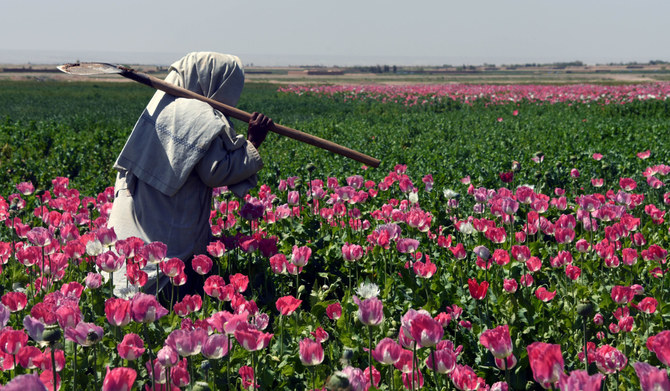
Myanmar, once celebrated for its rich cultural heritage and breathtaking landscapes, now finds itself at the center of a burgeoning crisis. The Southeast Asian nation has stealthily risen to become the world’s largest opium producer, a dubious distinction that raises grave concerns both domestically and internationally. As Myanmar’s opium production soars, it not only threatens the country’s stability and development, but also fuels a global narcotics trade with devastating consequences.
In recent years, Myanmar’s opium cultivation has surged dramatically, with estimates suggesting that it now accounts for a significant portion of the world’s supply. The opium produced in Myanmar is not merely confined within its borders; rather, it permeates global markets, feeding the insatiable demand for illicit narcotics. The primary destination for Myanmar’s opium is neighboring countries in Southeast Asia, where it is refined into heroin and trafficked to international markets, including Europe and North America. This illicit trade network has far-reaching implications, contributing to drug addiction, organized crime and societal instability across continents.
The question that needs to be answered is: why is Myanmar producing opium at such an alarming rate? The answer lies in a complex interplay of socioeconomic factors, including poverty, political instability and the absence of viable alternative livelihoods under the brutal military regime.
Decades of internal conflict and political turmoil have left Myanmar’s rural communities disenfranchised and economically marginalized. In regions where government authority is weak or nonexistent, illicit activities such as opium cultivation offer a means of survival for impoverished farmers who lack access to legitimate sources of income.
Illicit activities such as opium cultivation offer a means of survival for impoverished farmers who lack access to legitimate sources of income
Dr. Azeem Ibrahim
Moreover, the geographical terrain of Myanmar, characterized by rugged mountains and dense forests, provides ideal conditions for opium poppy cultivation. This, coupled with weak law enforcement and governance, creates a conducive environment for the illicit drug trade to thrive. The allure of quick profits further incentivizes farmers to engage in opium cultivation, perpetuating a cycle of poverty and dependency that is difficult to break.
While Myanmar grapples with the escalating opium crisis, another nation has made significant strides in curbing opium production: Afghanistan. Despite being historically synonymous with opium cultivation, it has managed to slash its opium production by a staggering 95 percent — a feat attributed largely to the Taliban’s strict enforcement of anti-narcotics measures. Under Taliban rule, poppy cultivation has been severely restricted, with farmers facing harsh penalties for noncompliance.
The Taliban’s success in reducing opium production in Afghanistan underscores the pivotal role of political will and effective governance in combating the narcotics trade. By implementing stringent enforcement measures and promoting alternative livelihoods, the Taliban have demonstrated that it is possible to stem the tide of opium cultivation, even in regions plagued by conflict and instability. Any post-military government in Myanmar could draw valuable lessons from Afghanistan’s experience and leverage political commitment to address the country’s own opium crisis.
However, replicating Afghanistan’s approach in Myanmar would also present unique challenges and complexities. Unlike Afghanistan, where the Taliban exercise authoritarian control, Myanmar’s political landscape is characterized by a delicate balance of power between the junta and civilian government institutions. Efforts to eradicate opium cultivation must navigate this intricate political terrain and garner consensus among various stakeholders with divergent interests.
Myanmar’s emergence as the world’s largest opium producer represents a pressing humanitarian and security challenge
Dr. Azeem Ibrahim
Furthermore, any sustainable solution to Myanmar’s opium crisis must address the root causes driving illicit cultivation. This necessitates a multifaceted approach that combines law enforcement with comprehensive socioeconomic development initiatives. Investment in infrastructure, education and healthcare can empower rural communities and provide viable alternatives to opium cultivation. Additionally, strengthening governance mechanisms and promoting transparency are essential for combating corruption and eradicating the entrenched networks that facilitate the narcotics trade.
International cooperation also plays a crucial role in addressing the global dimensions of Myanmar’s opium crisis. The international community must work in tandem with the Myanmar government to strengthen law-enforcement capabilities, disrupt trafficking networks and provide assistance for socioeconomic development projects. Concerted efforts at the regional and global levels are indispensable for tackling the transnational nature of the narcotics trade and preventing the proliferation of illicit drugs.
Myanmar’s emergence as the world’s largest opium producer represents a pressing humanitarian and security challenge with far-reaching implications. The nexus between opium cultivation, poverty and instability underscores the urgent need for comprehensive interventions that address both the supply and demand sides of the narcotics trade.
By learning from the experiences of countries like Afghanistan and leveraging international cooperation, Myanmar can chart a path toward a future free from the scourge of opium cultivation. Failure to act decisively risks perpetuating a cycle of suffering and deprivation that undermines the country’s prospects for peace, prosperity and development.
• Dr. Azeem Ibrahim is the director of special initiatives at the Newlines Institute for Strategy and Policy in Washington, DC. X: @AzeemIbrahim












